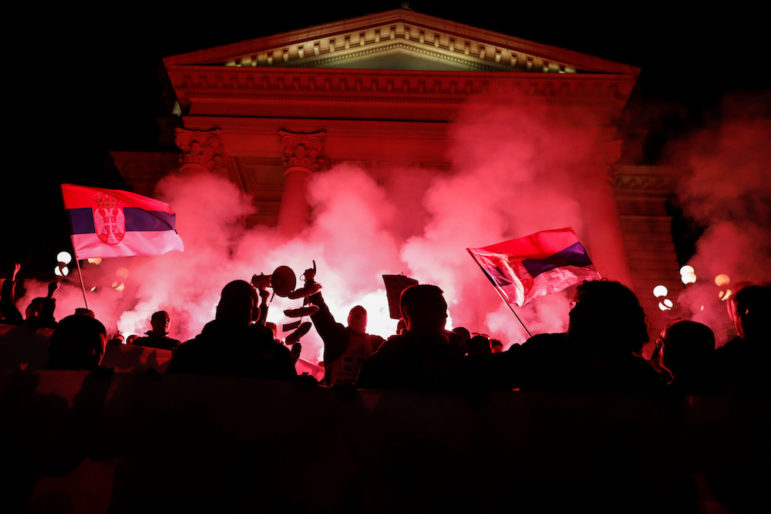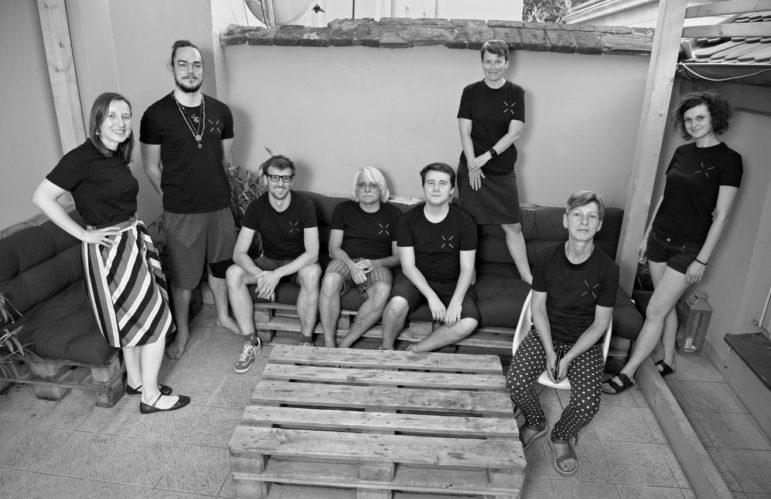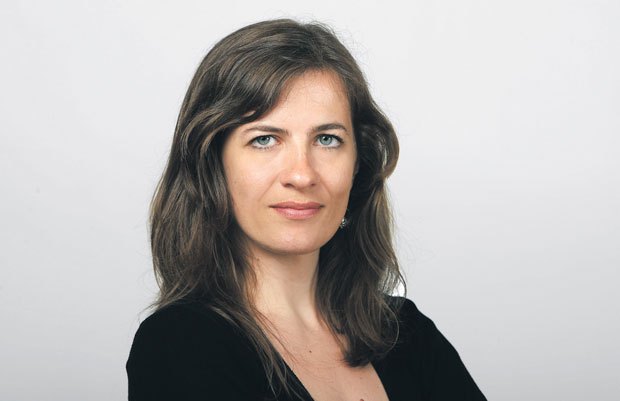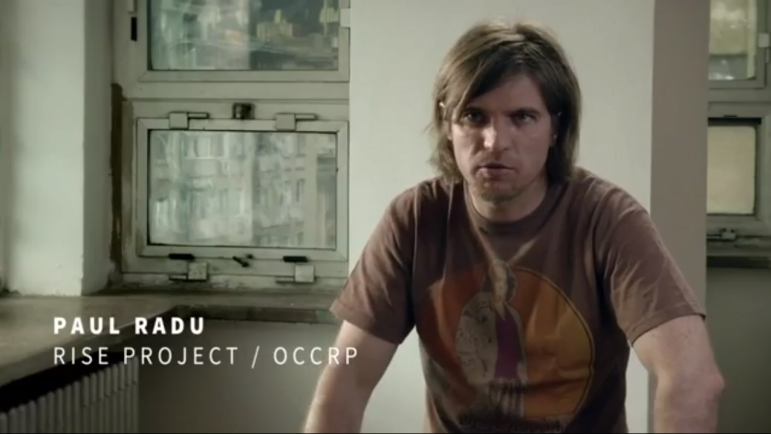

Demonstrators set off flares in front of Serbia's parliament building during a protest against President Aleksandar Vucic and his government in Belgrade on February 16, 2019. Photo: Reuters / Marko Djurica
The Trouble Brewing in Serbia: KRIK’s Editor Talks Media and Power

Demonstrators set off flares in front of Serbia’s parliament building during a protest against President Aleksandar Vucic and his government in Belgrade on February 16, 2019. Photo: Reuters / Marko Djurica
Stevan Dojcinovic is an investigative reporter based in Belgrade and editor-in-chief of GIJN-member KRIK (Crime and Corruption Reporting Network), a nonprofit newsroom established to improve investigative journalism in Serbia.
Dojcinovic is also a regional editor for the Organized Crime and Corruption Reporting Project. He has specialized in investigating organized crime, corruption, privatization deals, money laundering, private security agencies and the gambling industry. He is the author of a book about the role of the Balkan mafia in international cocaine smuggling, and teaches journalists how to collect and analyze business data and property records. Among his awards: the 2018 Award for Outstanding Merits in Investigative Journalism, given by the Central European Initiative and the South East Europe Media Organisation.
Francesco Martino spoke with Dojcinovic for the Osservatorio Balcani e Caucaso – Transeuropa, a think tank focused on Southeast Europe, Turkey and the Caucasus, about media and power in Serbia. A Balkan nation of seven million, Serbia hopes to join the European Union, but in recent years it has lost serious ground on press freedom and democratic rule.
How do you assess the current situation of media freedom in Serbia?

A problem with the press: EU-hopeful Serbia. Credit: Wikipedia.
There are some free media outlets in Serbia, of course, but there is little or no free mainstream media. If we talk about big Serbian media corporations or outlets with a wider reach among the public, there are very few that can be defined as truly independent. The government controls most of the media, not through direct ownership, but thanks to financial measures. The Serbian government is currently supplying a lot of money to the media in different ways. Sometimes public companies or the government itself advertise in these media; sometimes money is channeled through so-called “project financing,” which allows outlets to apply directly for public funding. Most of the allocated budget, of course, goes to media considered “friendly” by the government. The few free media in Serbia — newspapers, online outlets, TVs or radios — are generally smaller and with a relatively limited outreach.
What are the main challenges KRIK and other independent media face in Serbia to preserve their freedom?
It’s difficult to be a free outlet in Serbia, essentially because this goes against the general intentions of the government. The ones in power in Belgrade don’t like any kind of stories criticizing the government, exposing corruption, and so on. But they don’t even accept different opinions, even on lighter topics. The Serbian government is extremely committed to putting pressure on the media and is investing a lot of money, resources and energies to control them. At the same time, since they don’t want to be seen as censors, they’re trying hard not to leave any fingerprints in this process, using subtle means to exert control. Most of the media are handled through financial means; with the rest, especially NGO-based ones with international donors, different mechanisms are put in place to discourage free reporting.
What kind of pressure has KRIK experienced over the last few years?
Pressure is applied on many different levels. For example, being an NGO-based and independent media group like KRIK means to be under constant surveillance by the state secret services. In a recent interview, one of the heads of the services stated that the presence of “foreign factors” is the main danger they deal with, explicitly naming NGOs and journalists as “top threats” to Serbia’s national security. For us, this was hardly a surprise: For a long time, we’ve been followed, surveilled, wiretapped. Much of the information gathered was leaked to tabloids close to the government that used it to lead smear campaigns against KRIK, exposing facts and episodes from our professional, but also personal lives. Smear campaigns by large-circulation tabloids under government control are a very effective tool used to restrict media freedom. When we publish stories about corruption in the institutions, we’re immediately attacked to divert the public opinion’s attention and implement a “damage control” strategy, which relies on the fact that mainstream media under their control have a much wider reach than our investigative reports.
Are legal means also used against the media?
Yes, lawsuits against journalists are becoming quite common in Serbia, no matter how fact-checked your investigations are. And often, top officials, like ministers, sue the media. For example, KRIK was sued four different times for the same story by Nenad Popovic, a minister who heads up innovations and technological development. We asked to merge the lawsuits, but the court denied our request. So we are currently spending an enormous amount of time, money and energy to defend ourselves. And Popovic’s lawsuits are not the only ones we’re dealing with at the moment.
For years now, KRIK has been publishing investigations about corruption and organized crime in Serbia. What kind of impact have those had on public opinion?
They had a big impact, but at the same time, and on another level, no impact at all. I’ll try to explain better: Most of our stories reach the public, often far beyond the circle of our usual readers, and they provoke wider discussions [that affect] public opinion. When I sit in a taxi cab in Belgrade, for example, very often the driver will know, even in detail, about [our] stories. So we definitely manage to inform. Unfortunately, our capability to generate change in Serbian society remains largely unsatisfactory. People in our country don’t seem to perceive how harmful corruption really is; they read our stories but are not deeply motivated to insist politicians stop such practices. That’s why, at every election, they keep voting for the same people.
In the last few years, fake news and disinformation have become a very hot subject at the global level. One year ago, KRIK launched the project “Raskrikavanje,” focused on debunking disinformation. What are your findings about fake news production in Serbia?
Two years after we started running KRIK, we found out that it was not enough to publish the truth: Due to a large amount of fake news circulating in the local media, it was necessary to offer the public a tool to debunk those. For example, after we published a story on corruption, readers and viewers would be literally bombarded by pro-government media with fake information used to undermine the public’s trust in our investigations and in defense of the ones in power. With Raskrikavanje, we try to give the public an opportunity to better understand this [through] fact-checking and debunking false information. The interesting thing about Serbia is that while in most Western countries, the main sources and dissemination channels of fake news are the internet and social networks, allegedly with Russian involvement, in our country the big fake news producers are mainstream media, often on behalf of the government.
Have you registered any significant impact since you started Raskrikavanje?
Over the last year, we definitely managed to debunk a lot of fake news. In the short term, I believe Raskrikavanje proved to be a useful tool for the public to have a better understanding of the problem. In the long term, though, the challenge is much harder to address, and it will probably take years to see any visible result. The real problem is not in the single lies published, but in the overall fake narrative built by mainstream media, which, as I mentioned, have wide reach and often retain credibility they had in the past.
President Aleksandar Vucic’s Serbian Progressive Party has been in power since 2012. How much does Vucic’s communication strategy contribute to his political success?
Vucic openly controls everything in Serbia: Even the prime minister is completely dependent on the president’s will. I think Vucic proved himself a very skillful player in communicating with the electorate and inspiring his voters. To do so, he chose to present himself as a “man of the people.” He claims to be one of the poorest leaders in the region: He wears cheap suits, he doesn’t even have a watch and only recently showed [he owns] a smartphone. He wants to show he’s a regular guy, not affected or corrupted by power, and ready to suffer along with his fellow citizens. In public, Vucic always speaks from the position of opposition: Even if he has controlled the country for years, he always claims to be fighting unspecified “dark forces” inside or outside the country and blames the previous governments for every shortcoming of his administration. This strategy proved to be effective with the Serbian public opinion, and Vucic still enjoys wide support.
The real secret of his success, however, his strongest tool to maintain power, lies again in his control over mainstream media, which makes his narrative so pervasive and unchallenged. Vucic would be ready to give up on everything, but never on his control over the media.
This article first appeared on the Osservatorio Balcani e Caucaso – Transeuropa website and is reproduced here with permission.
 Francesco Martino worked in international cooperation in Kosovo before becoming a journalist. He has worked in Sofia since 2005, and in Bulgaria has collaborated with various Italian and international media providers. He speaks Bulgarian, Serbo-Croatian, Slovene and Macedonian. Based in Sofia, he has worked for Osservatorio Balcani e Caucaso since 2006.
Francesco Martino worked in international cooperation in Kosovo before becoming a journalist. He has worked in Sofia since 2005, and in Bulgaria has collaborated with various Italian and international media providers. He speaks Bulgarian, Serbo-Croatian, Slovene and Macedonian. Based in Sofia, he has worked for Osservatorio Balcani e Caucaso since 2006.










